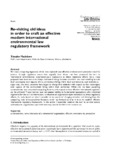Please use this identifier to cite or link to this item:
https://cris.library.msu.ac.zw//handle/11408/1349Full metadata record
| DC Field | Value | Language |
|---|---|---|
| dc.contributor.author | Madebwe, Tinashe | - |
| dc.date.accessioned | 2016-05-17T09:35:39Z | - |
| dc.date.available | 2016-05-17T09:35:39Z | - |
| dc.date.issued | 2015-06 | - |
| dc.identifier.issn | 1461-4529 | - |
| dc.identifier.uri | http://www.heinonline.org/HOL/Page?handle=hein.journals/envirlr17&div=14&start_page=100&collection=journals&set_as_cursor=0&men_tab=srchresults | - |
| dc.identifier.uri | http://hdl.handle.net/11408/1349 | - |
| dc.description.abstract | The most compelling arguments which have explored how effective environmental protection could be secured through regulatory means have arguably been those that have proposed the turn to international environmental organisation-style institutions to direct regulatory efforts. Sadly, these proposals have been unable to compel real-world change because countries have been unwilling to cede their sovereignty over aspects of the environment falling within their territories to such institutions. I argue that, over time, countries have begun to change their attitudes with respect to their sovereignty over aspects of the environment falling within their territories. While this has been occurring, constructivists have presented compelling theories with respect to how effective international regulation can be achieved. These theories have lent greater validity to fundamental assumptions which informed arguments for the turn to international environmental organisation-style institutions to direct regulatory efforts. As such, based on what I consider to be countries' changing attitudes and drawing from the compelling body of constructivist literature which has focused on what it takes to establish effective international regulatory frameworks, in this article I reconsider whether the turn to an international environmental organisation-style institution may now be feasible in the modern era. | en_US |
| dc.language.iso | en | en_US |
| dc.publisher | Sage Publications | en_US |
| dc.relation.ispartofseries | Environmental Law Review;Vol. 17, Issue 2; p. 100-116 | - |
| dc.subject | Constructivism, norm, international environmental organisation, effective environmental protection | en_US |
| dc.title | Re-visiting old ideas in order to craft an effective modern international environmental Law Regulatory Framework | en_US |
| dc.type | Article | en_US |
| item.openairecristype | http://purl.org/coar/resource_type/c_18cf | - |
| item.cerifentitytype | Publications | - |
| item.grantfulltext | open | - |
| item.languageiso639-1 | en | - |
| item.fulltext | With Fulltext | - |
| item.openairetype | Article | - |
| Appears in Collections: | Research Papers | |
Files in This Item:
| File | Description | Size | Format | |
|---|---|---|---|---|
| 17EnvtlLRev100.pdf | Abstract | 30.14 kB | Adobe PDF |  View/Open |
Page view(s)
20
checked on Jul 26, 2024
Download(s)
12
checked on Jul 26, 2024
Google ScholarTM
Check
Items in MSUIR are protected by copyright, with all rights reserved, unless otherwise indicated.


